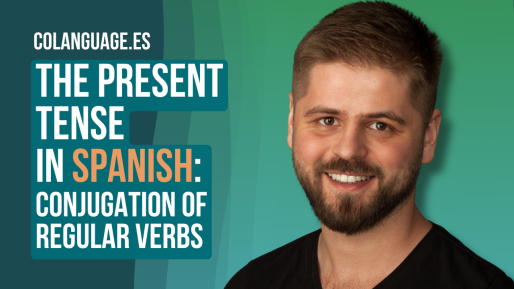Past tenses in Spanish: simple, imperfect, present perfect and past perfect Share Copied!
Spanish
This lesson covers the past tenses and explains when to use what tense. We have detailed lessons per tense available as well.
Video
Podcast
The past tenses in Spanish
In Spanish, there are many past tenses, including the simple past, the imperfect past, the present perfect, and the past perfect. They all help us describe actions that happened in the past.
- Ayer vi una película. (I watched a movie yesterday.) simple past
- Solíamos cantar todas las noches. (We used to sing every night.) imperfect past
- He visitado París. (I have visited Paris.) present perfect
- Ya se habían ido cuando llegamos. (They had already left by the time we arrived.) past perfect tense
The simple past tense in Spanish
The simple past, sometimes called preterite, is a tense that is used to talk about actions that happened at a specific moment in the past and have been completed.
| Personal pronoun | Spanish | English |
|---|---|---|
| Yo (I) | Fui al cine. | I went to the movies. |
| Ella/Él (She/He) | Compró un café. | She bought a coffee. |
| Nosotros/-as (We) | Ayer visitamos el museo. | Yesterday we visited the museum. |
Listening exercise
This dialogue shows how the simple past can be used.
| Spanish | English | |
|---|---|---|
| María | Yo fui al concierto el sábado pasado. | I went to the concert last Saturday. |
| Daniel | ¡Mi amiga también! Ella compró las entradas en el último momento. | My friend too! She bought the tickets last minute. |
| María | Nosotros fuimos en coche para llegar pronto. | We went by car to arrive early. |
The imperfect past tense in Spanish
The imperfect past tense is used to talk about things that happened regularly or were ongoing in the past.
| Personal pronoun | Spanish | English |
|---|---|---|
| Ella/Él (She/He/It) | Ella bailaba en todas las fiestas. | She used to dance at all the parties. |
| Yo (I) | Yo siempre comía helado en verano. | I used to always eat ice cream in the summer. |
| Nosotros/-as (We) | Nosotros íbamos al parque los domingos. | We used to go to the park on Sundays. |
Unlike the simple past, which indicates completed actions in the past, the imperfect past tense conveys a sense of continuity.
Listening exercise
Let's practise the imperfect past tense in a dialogue.
| Spanish | English | |
|---|---|---|
| María | ¿Qué hacías durante las vacaciones de verano? | What did you use to do during summer vacations? |
| Daniel | Yo comía helado en la playa mientras mi hermana bailaba. ¿Y vosotros? | I used to eat ice cream on the beach while my sister used to dance. And you? |
| María | Nosotros íbamos de acampada a la montaña. | We used to go camping in the mountains. |
The present perfect tense in Spanish
The present perfect tense is commonly used to talk about what has or hasn't happened yet, or to express actions that were completed in the past but have relevance to the present moment.
| Spanish | English | |
|---|---|---|
| Tú (You) | ¿Has visto la película? | Have you seen the movie? |
| Yo (I) | Nunca he estado en Jamaica. | I have never been to Jamaica. |
| Nosotros/-as (We) | Ya hemos hablado del viaje. | We have already talked about the trip. |
The present perfect tense is formed by using the auxiliary verb "haber" in the present tense combined with the past participle of the main verb.
Listening exercise
In this dialogue, we will practise the present perfect tense.
| Spanish | English | |
|---|---|---|
| María | ¿Has visto la nueva película de terror? | Have you seen the new horror movie? |
| Daniel | Sí, ha sido una de las mejores que he visto en mucho tiempo. | Yes, it's one of the best I have seen in a long time. |
| María | Yo he estado muy ocupado con el trabajo, aún no he podido ir. | I have been very busy with work, I haven't been able to go yet. |
| Daniel | Sí, hemos hablado de eso. Necesitas un descanso pronto. | Yes, we have talked about that. You need a break soon. |
The past perfect tense in Spanish
The past perfect is a tense used to express an action that happened before another action in the past, providing a sense of chronological order.
| Spanish | English | |
|---|---|---|
| Nosotros/-as (We) | Habíamos visto la película antes de su estreno. | We had seen the movie before it was released. |
| Ella/Él (She/He/It) | Cuando llegamos allí, ella ya se había ido. | By the time we got there, she had already left. |
| Ellos/-as (They) | Antes de que yo llegara, ya habían cenado. | Before I arrived, they had already eaten dinner. |
The past perfect tense is formed by using the auxiliary verb "haber" in the imperfect tense combined with the past participle of the main verb.
Listening exercise
This dialogue shows how the past perfect can be used.
| Spanish | English | |
|---|---|---|
| María | Habíamos visto una casa en venta a buen precio. | We had seen a house for sale at a good price. |
| Daniel | Yo quería hacer una visita, pero el agente inmobiliario ya se había ido. | I wanted to make a visit, but the real estate agent had already left. |
| María | Nos fuimos pronto, porque nuestros hijos todavía no habían cenado. | We left early, because our children hadn't had dinner yet. |
Key takeaways
Here is a quick summary of this lesson.
- The simple past is used to talk about actions that happened at a specific moment in the past and have been completed.
- The imperfect past is used to talk about things that happened regularly or were ongoing in the past.
- The present perfect is used to talk about what has or hasn't happened yet, or to express actions that were completed in the past but have relevance to the present moment.
- The past perfect is used to express an action that happened before another action in the past.
Subscribe to our social media channels to get free daily exercises!



